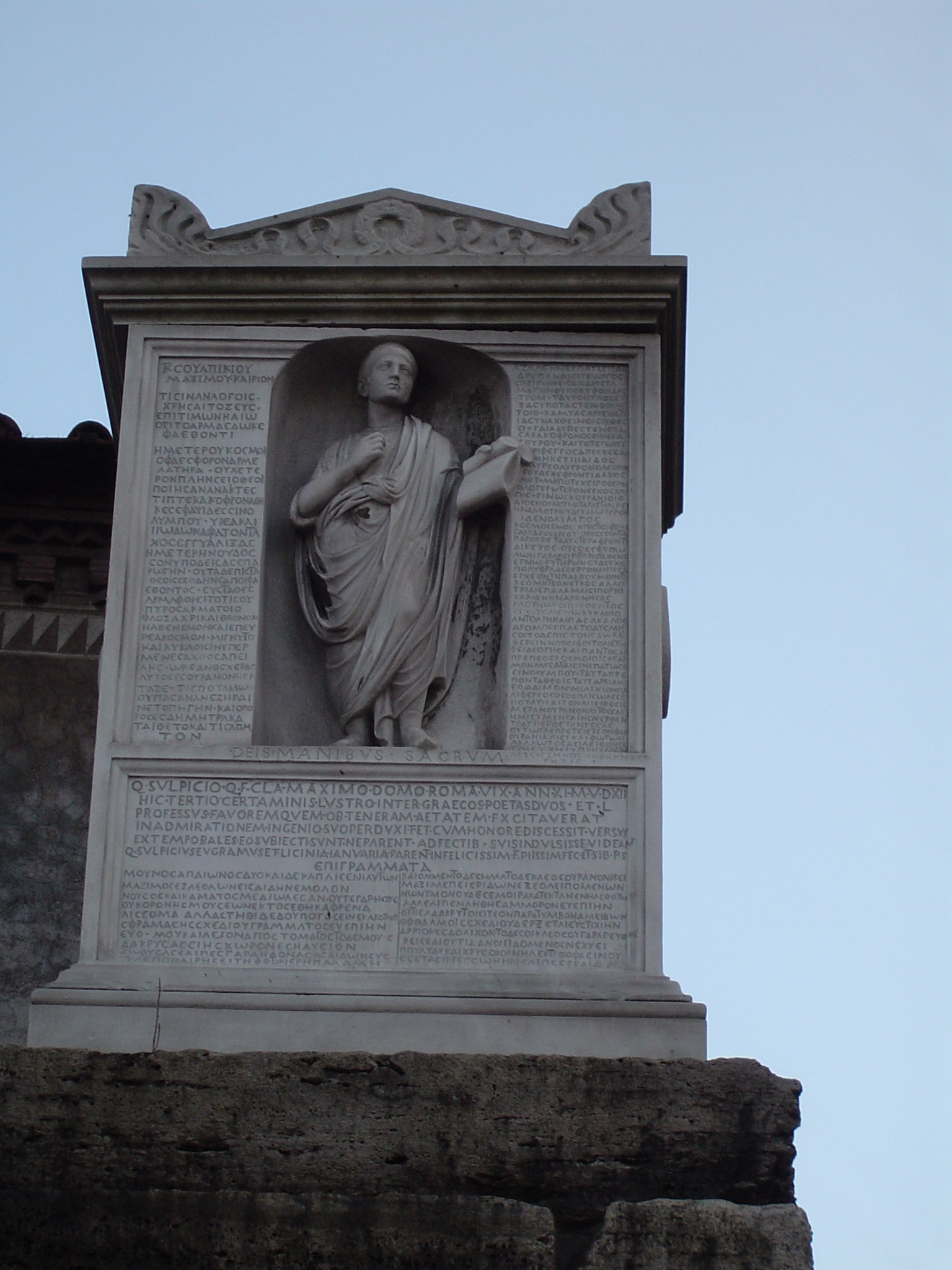Latin verse on:
[Wikipedia]
[Google]
[Amazon]
 The history of Latin poetry can be understood as the adaptation of Greek models. The verse comedies of Plautus, the earliest surviving examples of Latin literature, are estimated to have been composed around 205-184 BC.
The history of Latin poetry can be understood as the adaptation of Greek models. The verse comedies of Plautus, the earliest surviving examples of Latin literature, are estimated to have been composed around 205-184 BC.
History
Scholars conventionally date the start of Latin literature to the first performance of a play in verse by a Greek slave,Livius Andronicus
Lucius Livius Andronicus (; el, Λούκιος Λίβιος Ανδρόνικος; c. 284 – c. 204 BC) was a Greco-Roman dramatist and epic poet of the Old Latin period during the Roman Republic. He began as an educator in the service of a n ...
, at Rome in 240 BC. Livius translated Greek New Comedy for Roman audiences, using meters that were basically those of Greek drama, modified to the needs of Latin. His successors Plautus ( 254 – 184 BC) and Terence ( 195/185 – 159? BC) further refined the borrowings from the Greek stage and the prosody of their verse is substantially the same as for classical Latin verse.
Ennius (239 – 169 BC), virtually a contemporary of Livius, introduced the traditional meter of Greek epic, the dactylic hexameter, into Latin literature; he substituted it for the jerky Saturnian meter in which Livius had been composing epic verses. Ennius moulded a poetic diction and style suited to the imported hexameter, providing a model for "classical" poets such as Virgil and Ovid.
The late republic saw the emergence of Neoteric Poets
The Neoterikoi (Ancient Greek: '; Latin: ', "new poets") or Neoterics were a series of avant-garde Latin poets who wrote in the 1st century BCE. Neoteric poets deliberately turned away from classical Homeric epic poetry. Rather than focusing on the ...
, notably Catullusrich young men from the Italian provinces, conscious of metropolitan sophistication, and looking to the scholarly Alexandrian poet Callimachus for inspiration. Catullus shared the Alexandrian's preference for short poems and wrote within a variety of meters borrowed from Greece, including Aeolian
Aeolian commonly refers to things related to either of two Greek mythological figures:
* Aeolus (son of Hippotes), ruler of the winds
* Aeolus (son of Hellen), son of Hellen and eponym of the Aeolians
* Aeolians, an ancient Greek tribe thought to ...
forms such as hendecasyllabic verse, the Sapphic stanza and Greater Asclepiad, as well as iambic verses such as the choliamb and the iambic tetrameter catalectic (a dialogue meter borrowed from Old Comedy).
Horace
Quintus Horatius Flaccus (; 8 December 65 – 27 November 8 BC), known in the English-speaking world as Horace (), was the leading Roman lyric poet during the time of Augustus (also known as Octavian). The rhetorician Quintilian regarded his ' ...
, whose career crossed the divide between the Roman republic and empire, followed Catullus' lead in employing Greek lyrical forms, identifying with Alcaeus of Mytilene, composing Alcaic stanzas, and also with Archilochus
Archilochus (; grc-gre, Ἀρχίλοχος ''Arkhilokhos''; c. 680 – c. 645 BC) was a Greek lyric poet of the Archaic period from the island of Paros. He is celebrated for his versatile and innovative use of poetic meters, and is the ea ...
, composing poetic invectives in the Iambus tradition (in which he adopted the metrical form of the Epode or "Iambic Distich"). Horace was a contemporary of Virgil and, like the epic poet, he wrote verses in dactylic hexameter, but in a conversational and epistolary style. Virgil's hexameters are generally regarded as "the supreme metrical system of Latin literature."
Richard F. Thomas, ''Virgil: Georgics'' Vol. I, Cambridge University Press (1988), page 28.
See also
* Prosody (Latin) - the structural basis of verse in LatinReferences
* {{DEFAULTSORT:Latin Poetry Poetry movements Latin-language literature Poetry by language